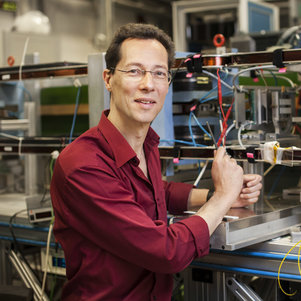Modern Physics
TN-Mi-189-16
Do you have a talent for Physics and Mathematics? Do you want to learn more about Quantum Mechanics, Entropy on a microscopic scale, Einstein’s special relativity, and quantum computing? In that case, the minor Modern Physics is for you!
Faculty of Applied Sciences
ECs: 30
Language: English
Maximum participants: 50
| Non-selection minor: | |
| Selection minor: |
Education methods
Lectures, tutorials, practicals, and an experimental and integrating final projectFor whom?
This minor is open to TU Delft Students from the following programs: Aerospace Engineering, Applied Earth Sciences, Applied Mathematics, Civil Engineering, Computer Science and Engineering, Electrical Engineering, Marine Technology, Mechanical Engineering, Molecular Science and Technology. Students Computer Science and Engineering are admitted if they have a strong mathematical background in analytical methods, such as calculus and linear algebra, since only then they can successfully finish this minor. In addition, students from the following programmes are admissible for this minor: BSc in Econometrics and Economics (EUR), Econometrie en Operationele Research (EUR), Econometrics and Philosophy of Econometrics (EUR), International Bachelor Econometrics and Operations Research (EUR), Sterrenkunde (UL), Wiskunde (UL). Students from programmes at other universities will only be admitted after a consultation with the coordinator of the minor.
Do you have a special talent for physics and mathematics, and do you want:
- To be shocked by the intuitive, 'unreal' world of quantum mechanics?
- To discover what entropy means on a microscopic scale?
- To understand the consequences of Einstein’s theory of special relativity for space and time?
- To find out about physical processes in living systems?
In that case, the Modern Physics minor will satisfy your curiosity. The minor covers 20th- and 21st-century physics, with courses on elementary particle physics, quantum mechanics, statistical physics, quantum engineering and applications, theory of relativity, biophysics and physics of radiation technology. The minor concludes with a group-based final experimental project in one of the Applied Sciences departments.
Please note: the minor Modern Physics is challenging. We advise students with vwo-grades for Wiskunde B and Physics lower than grade 7.5 to avoid doing this minor.
What will you learn?
During your engineering studies, you have learned to apply various physics theories to engineering practice: most probably, you have been exposed to Newtonian mechanics (statics and dynamics), electromagnetism and thermodynamics. This is what we call ‘classical physics’, which is based on theories developed before 1900 and describes almost all of the physics that is needed to understand the visible nature around us and that is relevant for engineering applications.
From the beginning of the 20th century, we saw the development of various important new insights, concepts and theories in physics. The theories of statistical physics, atomic and subatomic physics, and quantum mechanics describe and account for the fact that nature is not continuous and not deterministic. The theories of special and general relativity describe the nature of the universe at very large distances and very high velocities, where the concepts of time and distance no longer have a fixed meaning. All of this is now called ‘modern physics’. It is this modern physics that you will be introduced to in this minor programme. You will also be exposed to the science attitude, which is different from the engineering attitude. Whereas the focus in engineering is on problem solving and design, the focus in science is on basic understanding and knowledge generation through research.
It is our explicit choice not to discuss modern physics as it is discussed in popular media. As fun as popular books, magazines or TV shows may be in discussing relativity, black holes or quantum computers, they only talk about physics. They do not speak the language of physics, which comprises rather abstract theories expressed in mathematical formalisms. In this minor programme, you will learn to understand and speak the language of physics.
You will:
- Understand the theories of modern physics, such as quantum mechanics, relativity, physics of living matter and statistical physics.
- Learn to understand and speak the language of physics.
- Learn and apply the science attitude, the basic understanding and the generation of knowledge through research.
“Anybody who is not shocked by quantum theory has not understood it.” (Niels Bohr)
Course overview
-
TN2612 Theory of Relativity (3 ECTS):
Understanding the anti-intuitive consequences of Einstein’s special relativity theory for space and time.
TN2985 Introduction to experiments in physics (2 ECTS):
Setting up and executing an experiment, interpreting measurement data, analysing errors, and writing a research report.TN2986 Mathematical methods for Modern Physics (2 ECTS):
A condensed mathematics course for physicists.
TN2305 Quantum Mechanics for the minor (4 ECTS):
An introduction to the general concepts and basic mathematical formalism of quantum mechanics. -
TN2306 Quantum engineering and applications (3 ECTS):
Understanding of engineering aspects of quantum technologies.TN2625 Statistical Physics for the minor (4 ECTS):
How the statistical approach leads to an understanding of physical phenomena in classical and quantum mechanics
TN2994 Experimental and Integrating Final Project (9 ECTS):
Reading and understanding scientific articles, performing scientific research in a multidisciplinary team and writing an appropriate report on the basis of the formulation of a problem in the field of physics/applied physics.
Elective course (3 ECTS):
TN1651 Introduction to Biophysics (English):
Introduction to the molecular biology of a cell and concepts in biophysics.
TN1851 Radiation Science and Technology (Dutch!):
Introduction to the field of nuclear science and technology.TN2811 Introduction to Elementary Particles:
Introduction to experimental and theoretical approaches in elementary particle particle physics.
Register for this minor
Click here to register for this minor: Minors (tudelft.nl). Students from programmes at other universities will only be admitted after a consultation with the coordinator of the minor.
Students about this minor:
“It’s very cool to be thrown in at the deep end of quantum mechanics in the very first week of the minor.”
“The enthusiasm of the lecturers was infectious.”
